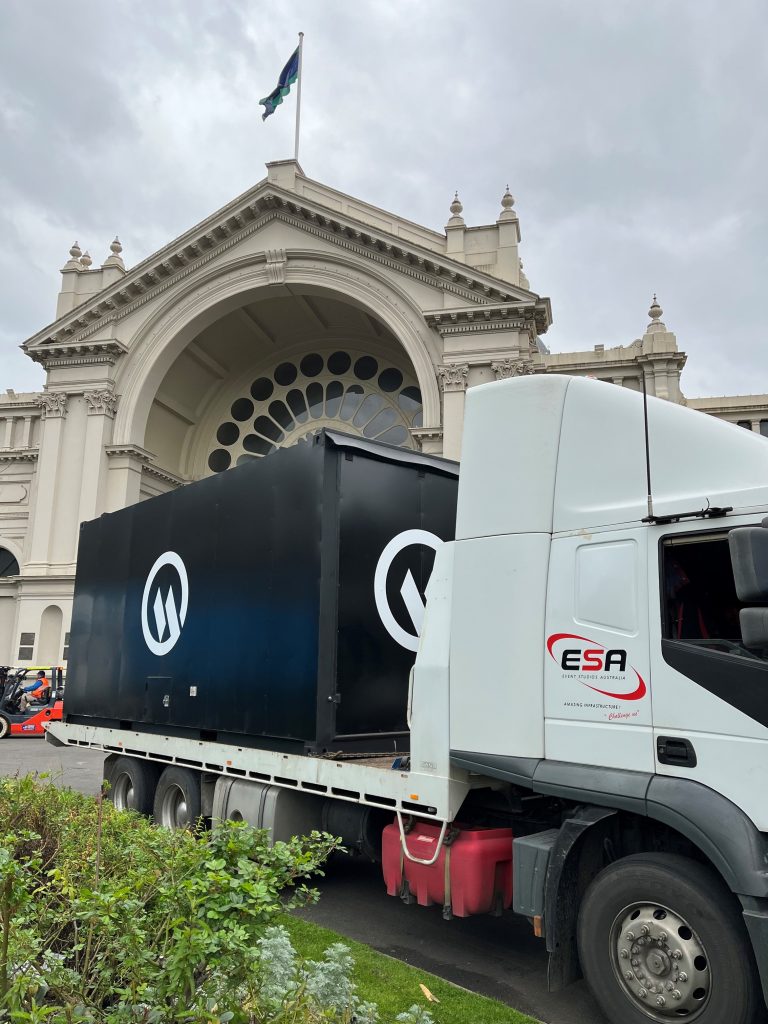Understanding Shipping Container Options
When you’re looking into getting a shipping container for your business, you’ll find there are two main ways to go about it: buying one outright or renting one for a period. Each approach has its own set of advantages and disadvantages, and understanding these differences is key to making the right choice for your specific needs. It’s not just about having a box to store things; it’s about how that container fits into your operations, your budget, and your long-term plans. For instance, if you’re thinking about creating unique spaces like shipping container bars, the flexibility and ownership that come with buying might be more appealing than the restrictions of a rental agreement.
New vs. Used Containers
When you decide to buy, you’ll generally encounter two types: new (often called ‘one-trip’) and used containers. New containers are typically in excellent condition, having only made a single journey from the factory. They offer the best quality and fewest potential issues, but come with a higher price tag. Used containers, on the other hand, have seen more service. They can be significantly cheaper, but you’ll need to inspect them carefully for damage, rust, or structural integrity. The condition of used containers can vary wildly, so it’s important to know what you’re looking for.
Container Sizes and Types
Shipping containers come in standard sizes, most commonly 20-foot and 40-foot lengths. You’ll also find different types, such as standard dry vans, high cubes (which offer extra height), and refrigerated units (reefers). Your choice will depend on what you intend to store or how you plan to use the container. For example, a standard 20-foot container might be sufficient for general storage, while a 40-foot high cube could be better suited for larger items or if you’re converting it into a workspace.
Modifications and Customisation
Whether you buy or rent, you might need to modify the container. This could involve adding doors, windows, insulation, ventilation, or even custom paint jobs. If you plan significant modifications, buying usually offers more freedom. Rental agreements often have strict rules about what alterations you can make, if any. If you’re aiming for something specific, like a unique shipping container bar or a custom office space, owning the container gives you the control to make those changes without needing permission.
The Case for Buying Shipping Containers
When you decide to buy a shipping container, you’re essentially making an investment in a long-term asset for your business. This approach offers a distinct set of advantages, particularly if your needs are ongoing or require a specific setup. Owning your container gives you complete control over its use and modification.
Pros of Buying
- Upfront Investment, Long-Term Savings: While the initial cost of buying a container is higher than renting, it often proves more economical over time. You avoid recurring rental fees, which can accumulate significantly, especially for extended periods. Think of it as paying a bit more now to save a lot later.
- Ownership and Versatility: Once purchased, the container is yours to use as you see fit. This means you can repurpose it for different storage needs, use it as part of a building project, or even modify it extensively. It becomes a flexible asset that can adapt to your evolving business requirements.
- Customisation Freedom: Buying allows you the liberty to modify the container to perfectly match your business operations. Whether you need to add shelving, insulation, specific ventilation, or even electrical outlets, you can make these changes without seeking permission or adhering to rental company restrictions.
- Potential Resale Value: Shipping containers, especially those in good condition, can retain a decent resale value. If your needs change or you upgrade, you can sell your container and recoup a portion of your initial investment. This is unlike rental fees, which are simply an expense.
Cons of Buying
- Higher Initial Outlay: The most significant drawback is the larger upfront cost compared to renting. This can be a barrier for businesses with limited capital or those who prefer not to commit a large sum at once.
- Responsibility for Maintenance: As the owner, you are responsible for all maintenance and repairs. This includes addressing rust, dents, or any wear and tear that occurs over time, which can add to the overall cost of ownership.
- Potential for Hidden Costs: Beyond the purchase price, be aware of potential additional expenses. These might include delivery fees, site preparation, permits for modifications, or costs associated with long-term storage if the container isn’t in constant use.
- Commitment to a Fixed Asset: Once bought, the container is yours. If your storage needs are temporary or change rapidly, you might find yourself with an asset that’s difficult to offload quickly or at a favourable price, unlike a rental unit that can simply be returned.

The Case for Renting Shipping Containers
Renting a shipping container can be a sensible choice for your business, particularly if your needs are short-term or if you’re testing the waters with containerised operations. It offers a degree of flexibility that buying simply can’t match, allowing you to adapt your storage or transport solutions without a significant long-term financial commitment.
Pros of Renting
- Lower Upfront Costs: The most immediate advantage of renting is the significantly lower initial outlay compared to purchasing. This can be a real lifesaver for businesses with tighter budgets or those just starting out.
- Maintenance Included: Typically, the rental company handles all necessary repairs and routine maintenance. This means you don’t have to worry about unexpected repair bills or the hassle of arranging upkeep, freeing up your time and resources.
- Flexibility and Scalability: Need more space during a busy season or less during a quiet period? Renting allows you to easily swap container sizes or return units when they’re no longer required. This adaptability is invaluable for businesses with fluctuating demands.
- No Long-Term Commitment: If your project is temporary, or you’re unsure about your future container needs, renting lets you avoid being tied down. You can simply return the container at the end of the rental period.
Cons of Renting
- Higher Long-Term Costs: While cheaper initially, rental fees can add up significantly over extended periods. If your need for a container stretches beyond a few months, the cumulative cost of renting might eventually surpass the price of buying.
- Limited Customisation: Most rental agreements come with restrictions on modifications. If you need to add insulation, shelving, or specific fittings, renting might not offer the freedom you require to tailor the container to your exact specifications.
- Availability Issues: The specific container you need might not always be available when you need it, especially if you require a particular size or condition. This can cause delays if you have urgent transport or storage requirements.
- Potential for Hidden Fees: Be aware of potential extra charges, such as those for locks, damage waivers, or late returns. It’s important to read the rental agreement carefully to understand all associated costs.
Renting offers a practical solution for short-term needs, but it’s wise to project your usage. If your business anticipates consistent, long-term use, the accumulating rental costs could make purchasing a more economical option over time.
Key Factors to Consider When Deciding
Deciding whether to buy or rent a shipping container for your business involves looking closely at a few key things. It’s not a one-size-fits-all answer, and what works for one business might not be the best fit for another. Thinking through these points will help you make a choice that genuinely benefits your operations.
Duration of Need
How long do you actually need the container? If your requirement is short-term, say for a few months or a year, renting often makes more sense. You get the use of the container without the commitment of ownership. However, if you anticipate needing the container for several years, or if it’s for a permanent setup like an on-site workshop or long-term storage, buying becomes a more attractive option. Buying a container for long-term use can be significantly more cost-effective over time.
Budget and Upfront Costs
Your budget plays a big role. Buying a shipping container requires a larger initial investment. This includes the purchase price, and potentially costs for delivery and any immediate modifications. Renting, on the other hand, usually involves lower upfront costs, often just a deposit and the first month’s rent. However, you need to consider the cumulative cost of renting over a longer period. While renting might seem cheaper initially, it can end up costing more than buying if you need the container for an extended duration.
Here’s a simple comparison:
| Factor | Renting | Buying |
|---|---|---|
| Upfront Cost | Lower | Higher (one-time) |
| Long-Term Cost | Can add up significantly | More economical over time |
| Maintenance | Usually handled by lessor | Your responsibility |
Customization and Modification Needs
Do you need to alter the container to suit specific business needs? Perhaps you need to add shelving, insulation, windows, or even a climate control system. If you plan on making modifications, buying usually offers more freedom. Rental agreements often have strict rules about what changes you can make, if any. Owning the container means you can customise it to your heart’s content, turning it into anything from a mobile office to a specialised storage unit. If your business requires a highly tailored solution, buying is likely the better path.
Think about your business’s future needs as well. Will your storage requirements change? Could the container be repurposed later? These questions can help guide your decision towards a more flexible or permanent solution.
Making the Right Choice for Your Business
Deciding between buying and renting a shipping container isn’t a one-size-fits-all situation. It really comes down to what your business needs right now and what you anticipate needing in the future. Think about it like this: if you only need a tool for a single job, you’d probably borrow or rent it, right? But if you’re going to use that tool every single day, buying it makes more sense. The same logic applies here.
Ultimately, the best choice is the one that saves your business money in the long run and best supports your operational goals.
To help you get there, consider these points:
- Duration of Need: How long do you genuinely expect to require the container? If it’s for a short-term project, a few months, or even a year, renting offers flexibility without the long-term commitment. If you foresee needing it for several years or indefinitely, buying becomes a more sensible investment.
- Budget and Upfront Costs: Buying a container requires a significant initial outlay. You’ll need to cover the purchase price, and potentially costs for delivery, permits, and any immediate modifications. Renting, on the other hand, usually involves smaller, regular payments, making it easier on your cash flow, especially if your budget is tight.
- Customisation and Modification Needs: If you plan to significantly alter the container – perhaps to create an office, workshop, or specialised storage – buying gives you the freedom to make those changes without restriction. Renting often comes with limitations on modifications, and you might incur extra fees for any alterations.
Take your time to really look at your business’s requirements. Don’t rush into a decision. Weighing up the costs, how long you’ll use it, and what you want to do with it will help you avoid unnecessary expenses down the track. It’s about finding that sweet spot between practicality and price for your specific situation.
Weighing up the Container Options
So, after looking at all the ins and outs, the decision between buying and renting a shipping container really comes down to what your business needs right now and what you see happening down the track. If you’ve got a short-term gig or your needs change a lot, renting offers that flexibility without a big upfront cost. But, if you’re in it for the long haul, using containers regularly, or even thinking about repurposing them later on, buying makes a lot more sense financially. It’s all about balancing the immediate costs with your future plans. Take a good look at your budget, how often you’ll actually use the container, and how long you’ll need it. That way, you can pick the option that genuinely helps your business move forward without any unnecessary headaches.
Frequently Asked Questions
When is it better for my business to buy a shipping container?
Generally, buying a shipping container is a smart move if your business needs it for more than a couple of years. If you’re constantly shipping goods or plan to build something with it, owning one makes good sense. It means you have it whenever you need it and can even modify it to suit your specific requirements, like adding insulation or extra doors. Plus, after you’ve paid it off, you can use it for whatever you like, even turning it into a cool office or a unique shop.
When should my business consider renting a shipping container instead?
Renting a shipping container is usually the way to go if you only need it for a short time, like a few months or up to a year. It’s also a good option if your business has busy periods and quiet periods, or if you’re just testing out if containers will work for your operations. Renting means you don’t have to worry about storing it when you’re done, and the rental company usually sorts out any repairs.
How do the costs of buying and renting compare for my business?
When you buy a container, you’ll have one big payment upfront. However, renting means you pay a smaller amount regularly, usually each month. While renting might seem cheaper at first, if you need the container for a long time, those regular payments can add up and end up costing you more than buying it outright. You also need to think about extra costs for buying, like upkeep and potential repairs, which aren’t usually your problem when you rent.
What are the differences in customisation options between buying and renting?
If you buy a container, you have complete freedom to change it however you like. You can add windows, insulation, special shelving, or even paint it a certain colour. When you rent, however, the rental company usually has strict rules about what you can and can’t do to the container. This means you might not be able to make the changes you need to make it perfect for your business.
How does the long-term commitment differ between buying and renting?
Buying a container means it’s yours forever. This can be great if your needs are long-term, but it can be a hassle if your needs change or you no longer need it. You’ll have to figure out how to sell it or get rid of it. Renting offers more flexibility; when you’re done with it, you just give it back to the rental company. This is handy if you’re not sure how long you’ll need it for.
Who is responsible for maintenance and repairs for bought versus rented containers?
When you buy a container, you’re responsible for its upkeep and any repairs needed. This means you might have to pay for regular check-ups and fix any damage. With renting, the rental company usually takes care of all the maintenance and repairs. This can save you time and money, especially if you don’t have your own maintenance team.

